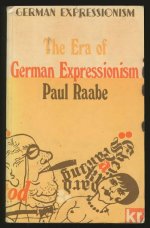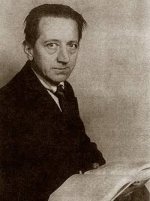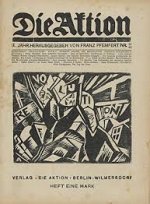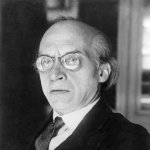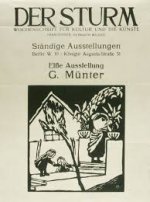You are using an out of date browser. It may not display this or other websites correctly.
You should upgrade or use an alternative browser.
You should upgrade or use an alternative browser.
Expressionism
- Thread starter Patrick Murtha
- Start date
Patrick Murtha
Reader
Expressionist drama was having a moment in the American theater of the 1920s: Elmer Rice’s The Adding Machine (1923), Eugene O’Neill’s Dynamo (1929) and others of his, Sophie Treadwell’s Machinal (1928), John Howard Lawson’s Processional (1925), Channing Pollock’s Mr. Moneypenny (1928), and more. The entire corpus of American Expressionist drama up to 1941, including some very obscure plays, is well discussed here:
https://ecommons.luc.edu/cgi/viewcontent.cgi?article=1215&context=luc_theses
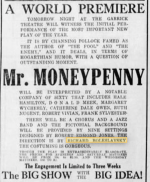
https://ecommons.luc.edu/cgi/viewcontent.cgi?article=1215&context=luc_theses

Ben Jackson
Well-known member
Key works of Expressionism:
Novels:
?? Auto Da Fae--- Elias Canetti
?? The Trial, The Castle--- Franz Kafka
??????? Under the Volcanoe--- Malcolm Lowry
??????? The Rainbow--- D H Lawrence
?? Tree of Man, Voss--- Patrick White
?? Berlin Alexanderplatz--- Alfred Doblin
?? The Sound and the Fury--- William Faulkner
?? Nightwood--- Djurna Barnes
?? V---- Thomas Pynchon
?? Gosta Berling's Saga---- Selma Lagerolf
Drama:
?? The Hairy Ape--- Eugene O'Neill
?? Machinal--- Sophie Treadwell
?? Adding Machine--- Elmer Rice
?? A Dream Play, Ghost Sonata, To Damascus-- August Strindberg
?? Mother Courage and Her Children--- Bertolt Brecht
?? Glass Menagerie--- Tennesse Williams
?? A View from the Bridge--- Arthur Miller
?? Last Days of Mankind--- Karl Kraus
Poets:
?? Arno Holz, Gottfried Benn, George Tarkl, Else-Lasker Schuler
?? Par Lagerkvist, Edith Sondergan
?? T S Eliot
Novels:
?? Auto Da Fae--- Elias Canetti
?? The Trial, The Castle--- Franz Kafka
??????? Under the Volcanoe--- Malcolm Lowry
??????? The Rainbow--- D H Lawrence
?? Tree of Man, Voss--- Patrick White
?? Berlin Alexanderplatz--- Alfred Doblin
?? The Sound and the Fury--- William Faulkner
?? Nightwood--- Djurna Barnes
?? V---- Thomas Pynchon
?? Gosta Berling's Saga---- Selma Lagerolf
Drama:
?? The Hairy Ape--- Eugene O'Neill
?? Machinal--- Sophie Treadwell
?? Adding Machine--- Elmer Rice
?? A Dream Play, Ghost Sonata, To Damascus-- August Strindberg
?? Mother Courage and Her Children--- Bertolt Brecht
?? Glass Menagerie--- Tennesse Williams
?? A View from the Bridge--- Arthur Miller
?? Last Days of Mankind--- Karl Kraus
Poets:
?? Arno Holz, Gottfried Benn, George Tarkl, Else-Lasker Schuler
?? Par Lagerkvist, Edith Sondergan
?? T S Eliot
Benny Profane
Well-known member
According to Brittanica (excelente definition, by the way):
Expressionism in literature arose as a reaction against materialism, complacent bourgeois prosperity, rapid mechanization and urbanization, and the domination of the family within pre-World War I European society. It was the dominant literary movement in Germany during and immediately after World War I.
In forging a drama of social protest, Expressionist writers aimed to convey their ideas through a new style. Their concern was with general truths rather than with particular situations; hence, they explored in their plays the predicaments of representative symbolic types rather than of fully developed individualized characters. Emphasis was laid not on the outer world, which is merely sketched in and barely defined in place or time, but on the internal, on an individual’s mental state; hence, the imitation of life is replaced in Expressionist drama by the ecstatic evocation of states of mind. The leading character in an Expressionist play often pours out his or her woes in long monologues couched in a concentrated, elliptical, almost telegrammatic language that explores youth’s spiritual malaise, its revolt against the older generation, and the various political or revolutionary remedies that present themselves. The leading character’s inner development is explored through a series of loosely linked tableaux, or “stations,” during which he revolts against traditional values and seeks a higher spiritual vision of life.

Expressionism in literature arose as a reaction against materialism, complacent bourgeois prosperity, rapid mechanization and urbanization, and the domination of the family within pre-World War I European society. It was the dominant literary movement in Germany during and immediately after World War I.
In forging a drama of social protest, Expressionist writers aimed to convey their ideas through a new style. Their concern was with general truths rather than with particular situations; hence, they explored in their plays the predicaments of representative symbolic types rather than of fully developed individualized characters. Emphasis was laid not on the outer world, which is merely sketched in and barely defined in place or time, but on the internal, on an individual’s mental state; hence, the imitation of life is replaced in Expressionist drama by the ecstatic evocation of states of mind. The leading character in an Expressionist play often pours out his or her woes in long monologues couched in a concentrated, elliptical, almost telegrammatic language that explores youth’s spiritual malaise, its revolt against the older generation, and the various political or revolutionary remedies that present themselves. The leading character’s inner development is explored through a series of loosely linked tableaux, or “stations,” during which he revolts against traditional values and seeks a higher spiritual vision of life.

Expressionism - Expressionism in literature
Expressionism in literature arose as a reaction against materialism, complacent bourgeois prosperity, rapid mechanization and urbanization, and the domination of the family within pre-World War I European society. It was the dominant literary movement in Germany during and immediately after...
www.britannica.com

